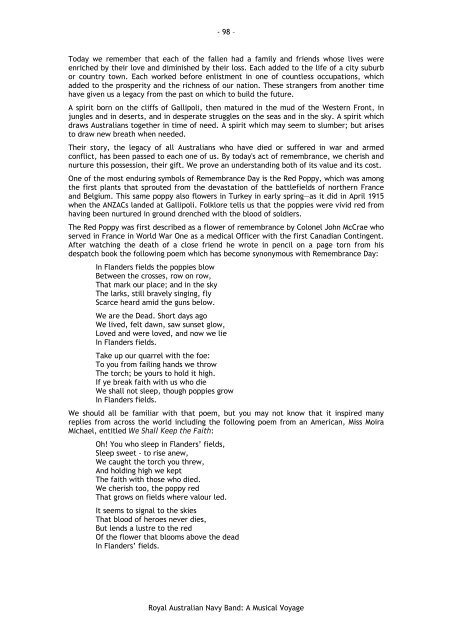A MUSICAL VOYAGE - Royal Australian Navy
A MUSICAL VOYAGE - Royal Australian Navy
A MUSICAL VOYAGE - Royal Australian Navy
Create successful ePaper yourself
Turn your PDF publications into a flip-book with our unique Google optimized e-Paper software.
- 98 –<br />
Today we remember that each of the fallen had a family and friends whose lives were<br />
enriched by their love and diminished by their loss. Each added to the life of a city suburb<br />
or country town. Each worked before enlistment in one of countless occupations, which<br />
added to the prosperity and the richness of our nation. These strangers from another time<br />
have given us a legacy from the past on which to build the future.<br />
A spirit born on the cliffs of Gallipoli, then matured in the mud of the Western Front, in<br />
jungles and in deserts, and in desperate struggles on the seas and in the sky. A spirit which<br />
draws <strong>Australian</strong>s together in time of need. A spirit which may seem to slumber; but arises<br />
to draw new breath when needed.<br />
Their story, the legacy of all <strong>Australian</strong>s who have died or suffered in war and armed<br />
conflict, has been passed to each one of us. By today's act of remembrance, we cherish and<br />
nurture this possession, their gift. We prove an understanding both of its value and its cost.<br />
One of the most enduring symbols of Remembrance Day is the Red Poppy, which was among<br />
the first plants that sprouted from the devastation of the battlefields of northern France<br />
and Belgium. This same poppy also flowers in Turkey in early spring—as it did in April 1915<br />
when the ANZACs landed at Gallipoli. Folklore tells us that the poppies were vivid red from<br />
having been nurtured in ground drenched with the blood of soldiers.<br />
The Red Poppy was first described as a flower of remembrance by Colonel John McCrae who<br />
served in France in World War One as a medical Officer with the first Canadian Contingent.<br />
After watching the death of a close friend he wrote in pencil on a page torn from his<br />
despatch book the following poem which has become synonymous with Remembrance Day:<br />
In Flanders fields the poppies blow<br />
Between the crosses, row on row,<br />
That mark our place; and in the sky<br />
The larks, still bravely singing, fly<br />
Scarce heard amid the guns below.<br />
We are the Dead. Short days ago<br />
We lived, felt dawn, saw sunset glow,<br />
Loved and were loved, and now we lie<br />
In Flanders fields.<br />
Take up our quarrel with the foe:<br />
To you from failing hands we throw<br />
The torch; be yours to hold it high.<br />
If ye break faith with us who die<br />
We shall not sleep, though poppies grow<br />
In Flanders fields.<br />
We should all be familiar with that poem, but you may not know that it inspired many<br />
replies from across the world including the following poem from an American, Miss Moira<br />
Michael, entitled We Shall Keep the Faith:<br />
Oh! You who sleep in Flanders’ fields,<br />
Sleep sweet - to rise anew,<br />
We caught the torch you threw,<br />
And holding high we kept<br />
The faith with those who died.<br />
We cherish too, the poppy red<br />
That grows on fields where valour led.<br />
It seems to signal to the skies<br />
That blood of heroes never dies,<br />
But lends a lustre to the red<br />
Of the flower that blooms above the dead<br />
In Flanders’ fields.<br />
<strong>Royal</strong> <strong>Australian</strong> <strong>Navy</strong> Band: A Musical Voyage

















